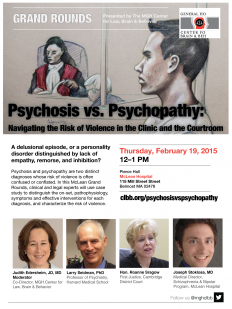By Simon Ducharme, Bruce H. Price, Mykol Larvie, Darin D. Dougherty, and Bradford C. Dickerson | American Journal of Psychiatry | September 1, 2015
Summary:
Frontotemporal dementia (FTD) describes a heterogeneous group of neurodegenerative diseases featuring various combinations of behavioral changes, language abnormalities, social cognitive impairment, and executive function deficits. FTD is divided into two major clinical syndromes: the behavioral variant (bvFTD) (1) and the language variants referred to as primary progressive aphasias (2).
Identifying bvFTD is challenging because symptoms can be subtle in the early stages, and they may combine features that are traditionally within the realm of psychiatry (e.g., personality changes, lack of empathy, compulsions) and others usually seen by neurologists (e.g., aphasia, cognitive impairments). Patients are often first evaluated in general psychiatric settings, and about 50% are initially diagnosed with a primary psychiatric illness (3).
Knowledge about FTD has grown exponentially over the past 10 years, and it is crucial for psychiatrists to include bvFTD as part of their differential diagnosis in a wide range of adult psychiatric disorders. In this article, we review the clinical approach to bvFTD, focusing in particular on the differential diagnosis between bvFTD and primary psychiatric disorders.





